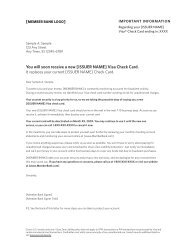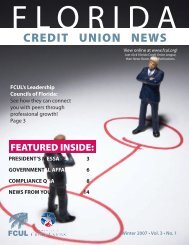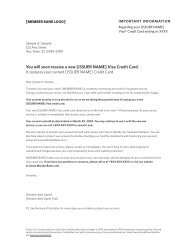credit union news - Home - Welcome to Florida Credit Union League
credit union news - Home - Welcome to Florida Credit Union League
credit union news - Home - Welcome to Florida Credit Union League
Create successful ePaper yourself
Turn your PDF publications into a flip-book with our unique Google optimized e-Paper software.
FEATURE ARTICLEpite economyf Investment Officer, Southeast CorporateFYI ...Investment terms definedmonth Treasury bill and the five year Treasury note)exceeded 170 basis points (1.70 percent) by thetime the recession had run its course. The current70 bps spread indicates the strong likelihood thatshort-term rates have further <strong>to</strong> fall, a view sharedby many in the investment community. It istherefore prudent <strong>to</strong> extend asset duration fartherout the curve in anticipation of increased netinterest margins as overnight sensitive liabilitiesre-price lower along with the Federal Reserve’slikely course of aggressive easing.While extending asset duration, <strong>credit</strong> <strong>union</strong>sshould still be mindful of the heightened liquidityrisk in this environment and manage accordingly.Most notably, <strong>credit</strong> <strong>union</strong>s should carefullyconsider the level of liquidity required for dailyoperating needs. A <strong>credit</strong> <strong>union</strong> should moni<strong>to</strong>rits his<strong>to</strong>rical needs and the ebb and flow of itsfunding. At Southeast we compute a monthlyaverage of our short-term deposits and also astandard deviation in order <strong>to</strong> create a confidenceinterval of the available liquidity.Additionally, <strong>credit</strong> <strong>union</strong>s should ensurethat they have ample external liquidity sourcesshould the need arise. Some examples include<strong>credit</strong> facilities from other financial institutions,non-member deposits, and, potentially, the sale ofearning asset. It is also suggested that <strong>credit</strong> <strong>union</strong>sconsider the process they would undertake if theyfind themselves needing additional funding. Itwould be beneficial <strong>to</strong> consider the prioritizationof an external funding source, considering boththe pricing as well as the speed and ease of access.To reiterate, despite the difficult operatingenvironment that all financial institutionsfind themselves in, <strong>credit</strong> <strong>union</strong>s are uniquelypositioned <strong>to</strong> continue <strong>to</strong> thrive over the nextseveral quarters and the foreseeable future.Several generally obscure investment terms have garnered thespotlight of the mainstream media lately due <strong>to</strong> the recent marketdislocation. Because these terms had generally been referencedinfrequently in the <strong>credit</strong> <strong>union</strong> system, it might be helpful <strong>to</strong>provide definitions of several of these terms.Market Dislocation: Might as well start here since we hear this terma lot these days. This is not a strictly financial or economic term, butmore of a slang term used <strong>to</strong> describe a disorderly market. Simplystated, market dislocation refers <strong>to</strong> the poor liquidity and thereforepricing that one finds in valuing or attempting <strong>to</strong> trade securities,often leading <strong>to</strong> worse pricing than a security’s fundamentalswould dictate. Ultimately the dislocation references a lack of anagreed upon price point between buyers and sellers, leading <strong>to</strong>opaque pricing.Auction Rate Securities (ARS): These are securities with a longstated maturity which have their interest rates re-set frequentlythrough a Dutch auction process, making the securities look muchmore like a money market security. The Dutch auction processallows competitive bidding <strong>to</strong> occur in which progressive bids areaccumulated from lowest <strong>to</strong> highest <strong>to</strong> fill an order. The last order <strong>to</strong>buy that matches the last of the sell orders establishes the winningrate. This new rate will then apply <strong>to</strong> all inves<strong>to</strong>rs for a particularissue until the next auction date. The auction cycle occurs on aregularly scheduled basis usually every 28 <strong>to</strong> 35 days. The ARSmarket is undergoing significant turmoil because of the market’sreliance on the “backs<strong>to</strong>p” bid generally provided by the broker/dealer who brought the security <strong>to</strong> market. As the large brokershave been forced <strong>to</strong> deal with other issues, they have declined <strong>to</strong>offer bids for the securities leading <strong>to</strong> many failed auctions. Theparticipation of the sponsoring broker/dealer in helping an auctionclear was generally assumed by most inves<strong>to</strong>rs.Unrealized Loss: An unrealized loss refers <strong>to</strong> a decline in the valueof a security which has not been sold, hence the loss has not beenyet been incurred in real terms. In the case of a debt instrument,Continued on page 17Spring 2008 5







